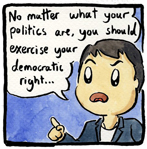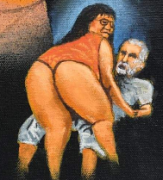- Extreme0
- Feb 28, 2013
-

I dance to the sweet tune of your failure so I'm never gonna stop fucking with you.
Continue to get confused and frustrated with me as I dance to your anger.
As I expect nothing more from ya you stupid runt!

|
Headline gave me cringe cancer
quote:HEALTH chiefs have warned that plans to scrap a tax on air travel will increase the risk of skin cancer and the spread of infectious diseases such a SARS in Scotland. In its response to a Scottish Government consultation over replacing Air Passenger Duty (APD), NHS Health Scotland also expressed fears that a likely increase in pollution and carbon emissions as a result of more flights would have a detrimental impact on public wellbeing. A string of other groups outlined strong opposition to the proposals to halve and eventually axe the tax, which it was claimed would undermine efforts to tackle climate change, offer a disproportionate boost to the rich and offered no guarantees of economic growth.
However, business organisations and airlines largely welcomed the plan, which remains on course to come into force after control of the levy is devolved to Holyrood in 2018. In its submission, NHS Health Scotland accepted that the stated aim of the policy - boosting the economy - could have a positive impact on health but said "balancing factors" should also be taken into account.
It added: "If a reduction in APD increases air travel as seems likely, there is likely to be an increase in air pollution and carbon emissions, which will have local negative impacts on health and longer-term negative impacts through climate change on the economy and health. The balance of potential benefits from economic development as opposed to negative impacts through climate change and air pollution is unclear. "There is also a risk that increased incoming air travel of visitors to Scotland may increase the incidence of transmissible diseases as was the case of SARS and influenza. If increased air travel and connectivity results from a change to APD, additional prevention and/or mitigation measures may be required. "Finally, if the change to APD results in increased holidaying of Scots to hotter areas, Scotland could expect an increase in skin cancer in years to come if inadequate prevention measures are not in place, with resulting increases in health care costs."
The SNP's plan to cut APD, which currently raises £250m a year, has been attacked across the political spectrum with even the Scottish Conservatives, who traditionally favour tax cuts, saying it is not justified at a time of constrained public finances Of almost 100 respondents to the consultation who commented specifically on the proposed reduction in APD, 83 per cent, "expressed an objection to or raised concerns around the potential impact of the reduction in APD." Overall, 160 groups or individuals responded to the consultation, with 49 per cent of these expressing concerns despite the document not specifically asking for a view on the planned 50 per cent reduction.
The Scottish Government claimed a majority had supported its "strategic and policy objectives for improving Scotland’s air connectivity" and showed no sign of abandoning the policy. However, a series of high-profile bodies outlined strong opposition with Climate Chaos Scotland saying the responses should be "the final nail in the coffin" for the plan.
The Church of Scotland said the policy was inconsistent with a policy of cutting greenhouse emissions and would promote inequality with the richest flying more regularly. The Royal Society of Edinburgh warned that if a reduced rate of APD in Scotland led to greater demand for flights from Scottish airports, carriers could simply maintain current prices for consumers while increasing their profit.
Trade Union Unison said a cut to APD would "benefit the wealthiest, while increasing aviation emissions", describing "a lose, lose proposal for Scottish public services and for protecting our world for future generations."
Derek Mackay, the Finance Secretary, described APD as one of the most expensive taxes of its kind in the world. He added: "This will now allow us to take the next step and begin the process of developing plans on how a Scottish replacement tax should be structured and operated to help boost Scotland’s international connectivity and economic competitiveness, while giving due consideration to environmental issues."This a fundamental component of our efforts to boost Scotland’s economy through improving international connectivity and generating sustainable growth."
Mixed responce for the APD (Anal Pressure Dome)
quote:Plans to cut and replace air passenger duty (APD) in Scotland have been met with a mixed response. The Scottish Government has published the findings of its consultation on proposals for a replacement tax from 2018 after receiving 160 responses. It says the replacement tax is intended to boost Scotland's international connectivity and contribute to sustainable growth. About half of respondents agreed with the Government's policy objectives.
The SNP administration has also promised to reduce APD by 50% from April 2018 onwards and eventually abolish the tax. Almost half of those responding to the consultation expressed an objection to or raised concerns around the potential impact of the reduction in APD. The negative environmental impact of an increase in air travel was the most commonly cited reason for concern.
Finance Secretary Derek Mackay said: "UK APD is one of the most expensive taxes of its kind in the world. "It continues to act as a barrier to Scotland's ability to secure new direct international routes and maintain existing ones." He said the consultation results will "allow us to take the next step and begin the process of developing plans on how a Scottish replacement tax should be structured and operated to help boost Scotland's international connectivity and economic competitiveness while giving due consideration to environmental issues".
"Our plan, taking into account the responses to the consultations, will be to start reducing the overall burden of a new tax in Scotland from April 2018, implement a 50% reduction in full by the end of the current Scottish Parliament, and then abolish the tax entirely when public finances allow," he added. "This a fundamental component of our efforts to boost Scotland's economy through improving international connectivity and generating sustainable growth."
Liz Cameron, chief executive of Scottish Chambers of Commerce, said: "Unprecedented times call for unprecedented action from government and we would urge all of Scotland's political parties to get behind this essential measure for economic growth. "The Scottish Government has a unique opportunity to make use of their devolved power and send out a clear message to the world that Scotland is open for business. "A substantial reduction in our taxes on air travel will enable Scottish businesses to grow globally and also attract international investment into Scotland."
Hugh Aitken, director of business organisation CBI Scotland, said: "The Scottish Government's plan for a 50% cut in the replacement to APD is a welcome opportunity to give businesses a clear competitive boost, providing an estimated additional economic activity worth £200 million each year."
About time
quote:HAILED as creating a "property-owning democracy", it was a cornerstone of Margaret Thatcher’s "social revolution", spurring half a million Scots families on to purchasing their cut-price council home. But after nearly four decades, Right to Buy comes to an end in Scotland, a policy which changed the social fabric north of the Border by almost doubling the number of home owners.
Dwindling council housing stocks, growing waiting lists and the unforeseen creation of a new class, the buy-to-let landlord, has brought down the curtain of an often overlooked Thatcherite legacy. Nicola Sturgeon announced the scrapping of the policy three years ago, claiming it was necessary to protect access to socially-rented properties and address waiting lists. In the interim period there has been reports of a rush as those keen to get on the property ladder, or acquire a lucrative asset, rushed to meet the deadline.
In the year since it was introduced in 1980, a total of 494,580 council and housing association homes were sold under Right to Buy in Scotland. In the UK as a whole about 1.5 million homes have been sold in this manner in the intervening 35 years, an indication of its popularity north of the Border. Council tenants could be offered a 33 to 50 per cent discount, depending on how long they had lived in their home. The successes are well-rehearsed: families taking control of their own destinies in an affordable way and left with assets to pass to their children or sell to them through their later years.
But recent figures suggest 400,000 people are on waiting lists for social housing and with development remaining sluggish, cutting off this property supply is seen as one way to address that. Ms Sturgeon has said her roll-back of the policy was not ideological but born of practical need. This, however, has done little to stop critics pointing out that her own parents bought their Ayrshire family home for £8,500 in 1984, claiming she is somehow a product of Mrs Thatcher’s successes. Those who support its abolition claim that one net result of the policy has been the massive rise in the private rental market, often with much poor quality accommodation, higher rents and thus greater social security spend.
Buy-to-let has also been cited as a factor in the undermining of the social and indeed physical fabric of working class neighbourhoods. As many as one-quarter of properties sold via Right to Buy are now being let in the private rental sector. Fraser Stewart runs the New Gorbals Housing Association in Glasgow. He said: “The classic story is of children buying their mother’s flat worth about £90,000 for £25,000, she dies and they it rent for £650 per month to precisely the client group we would have let it to for £350, except we do repairs, provide a service, are accountable and properly regulated. “When you factor in the discounts and additional housing benefit it boils down to handing about £95,000 to a random private landlord, as well as a free asset which could be worth £130,000 in a couple of decades.”
In South Lanarkshire, more than 39,000 homes have been sold through Right to Buy – equivalent to 60 per cent of its stock since 1980. But in some areas, 90 per cent of the council stock has been sold under the scheme. A council spokesman said: “Waiting lists have risen and the council’s ability to meet housing need in the area has been significantly reduced. "Whatever the arguments over the Right to Buy were, everyone involved in council housing including tenants representatives have agreed that it’s a policy that has had its day. “South Lanarkshire Council, like others across Scotland, is looking forward to being able to increase supply and retain its housing stock for rent to meet the considerable levels of need for housing required by residents in South Lanarkshire.”
Dr Mary Taylor, chief executive officer of the Scottish Federation of Housing Associations, added: “This hasn’t come a moment too soon. Right to Buy has had its day and has no place in modern Scotland.” But for the Tories, the decision to scrap the scheme is “nothing more than a political dogma and nothing to do with protecting the housing stock”.
Housing spokesman Alex Johnstone said: “Right to Buy has been the most effective single measure to enable a whole generation on modest incomes to take pride in owning their own property. “It has also delivered the kind of mixed tenure communities that modern planners now seek to replicate. “Nicola Surgeon would do well to remember that her own parents benefited from the scheme and she wouldn’t be where she is today without that hand-up.”
Housing Minister Kevin Stewart said: “With thousands of people on waiting lists for council and housing association houses, it was only right for us to scrap this scheme as we could no longer afford to see the social sector lose out on badly needed homes.”
Right To Buy: The Landlords Revenge by Professor Douglas Robertson
The ‘Right to Buy’ is a complex issue, which has brought with it a host of unintended consequences. As initially envisaged by Margaret Thatcher it was designed to break-up the property empires of large municipal authorities, and challenge the political and financial power of the Labour Party. Looking back at 1970s council housing, given its often deplorable build quality and poor day-to- day management it was easy to have some empathy with that ambition.
Council housing long provided the only significant income stream into councils, with much cash diverted to other council services especially general administration, legal services, cleansing and landscape maintenance via block charging arrangements. It was also the means to stimulate growth of an emerging industry much lauded by the Conservative Party, the Financial Sector. By deeply discounting council house sales to tenants, mortgage lenders, both banks and building societies were able to safely grow their lending ‘down market’ and profit handsomely from that.
Those residing in good quality council houses and who were working found the mortgage payments to be less than the rent, so sales grew. New Towns and the SSHA joined in so that from a position of having 75 per cent of Scottish housing in some variant of public ownership, it is now just under 30 per cent, equally split between council landlords and housing associations. The loss of the ‘blue chip’ properties from the councils housing revenue accounts, those built a long time back to a good standard with a low outstanding debt and limited on-going management and maintenance costs had long subsidised the newer, less successful often high rise and system build stock, thus ensured rents rose significantly and council housing polarised from mass housing venture to the housing of last resort.
The ‘Right-to- Buy’ properties formed over time a new element within the growing Scottish housing market, a new offering at the ‘cheaper end’, although a few became highly sought after. This stock was lost to tenants, or was it? Now with the housing market repercussions of the 2008 property crash and the closing down of mortgage access to younger first-time buyers others have stepped in and bought up ex-‘Right to Buy’ properties via a new lender product, the ‘Buy to Let’ mortgage. Private renting in Scotland has more than doubled in the last 20 years from just under 7 per cent to now just over 15 per cent of the entire Scottish housing stock, and a very significant element of that growth has been ex-council houses, originally bought under the ‘Right to Buy’.
Given the marked improvement in housing association and council housing quality, a policy pursued by both the Labour / Liberal and SNP administrations, via the Scottish Housing Quality Standard, we now have the peculiar situation that in any street of what was originally council housing there can be two quite similar houses, one still owned by the council and rented out, a now good quality home at an affordable rent. Next door, the neighbouring property has not seen much improvement, except for the 1980s B & Q mock Georgian front door. That ex-‘Right to Buy’ property is also now rented out, but at twice the price of the neighbouring property.
The ‘Right to Buy’ has gone, but its consequences will play out within both the housing market and Scottish public policy for decades more. Council housing appeared in 1919 to provide decent housing at a fair rent for the skilled working class, to provide ‘Homes for Hero’s’ returning from war. The then Government decreed that the private market, composed of small individual investor landlords had failed. We then spent almost a century tracking the failures of that private landlord system, with ironically the Conservatives building more council houses under Macmillan during the 1950s than Labour.
It would now appear that the landlords are getting their revenge. Housing has always been about finance, and finance has always been about politics, that much has never really changed. The ‘Right to Buy’ was just one of these battles, and by obsessing about the houses we conveniently ignored the reality of what was actually going on.
Douglas Robertson is Professor of Housing at Stirling University
Tories win for now but Named Person isn't finished
quote:TRIALS of the controversial named person service should be immediately suspended after legislation the scheme is based on was found to be unlawful, campaigners have said. The No to Named Persons (NO2NP) group, which this week won a Supreme Court victory when it was ruled that Scottish Government plans for data sharing breached human rights laws, has warned that councils that have operated the scheme for years with Holyrood approval could now face having to pay out millions as a result of legal action.
The possibility was backed up by Jane Mair, a professor of law at Glasgow University. Asked whether councils running the scheme were in breach of the law and face court cases, she replied: "I think that is a possibility... because this legislation has followed on from practice that is already in place." Simon Calvert, NO2NP spokesman, said: "Many Scottish families whose lives have been already been impacted by illegal intrusions in recent years have approached us and are seeking legal advice." Calling for existing schemes to cease, he added: "They have no legal jurisdiction and in fact are in breach of the law. All the information which has been gathered in recent years should be handed over to families and any data which is held by public bodies should be removed and destroyed."
Councils operating the service, such as those Edinburgh, Highland and Lanarkshire, are believed to have reviewed their practices and taken legal advice. The Scottish Government has insisted it will make appropriate changes to the legislation before rolling out the named person service, which sees a state-appointed figure assigned to look out for the welfare of every child in Scotland, "as soon as possible".
However, the Scottish Tories yesterday said Nicola Sturgeon should now admit her law is not "proportionate and appropriate", as former children's minister Aileen Campbell claimed in March. The party's education spokeswoman, Liz Smith, said: "The SNP was told consistently that plans to share children’s confidential details were wrong. But critics were just brushed aside and told they were scaremongering. We now need to know how it was ever allowed to get to this stage. "Either the Scottish Government knew it risked breaking human rights laws and went ahead anyway, or didn’t realise – in which case it has been utterly negligent. The SNP needs to stop the arrogance and accept these plans were wrong."
Councils warned to prepare for legal battle
quote:COUNCILS trialling the controversial named person scheme should be "quaking in their boots" over a potential deluge of legal action after legislation the policy is based on was found to be illegal, campaigners have warned.
In a landmark ruling, the Supreme Court yesterday said that SNP plan to assign a state-appointed figure to look out for the welfare of every child in Scotland will have to be drastically overhauled as it breaches human rights legislation in its current form. The decision means that the named person will no longer be rolled out nationwide next month as originally planned. Ministers pledged to make changes to ensure the law does not overstep legal boundaries when sharing information about children and families, but insisted the scheme would still be brought in "as soon as possible."
However, the service was already up and running in several areas, including the Highlands, Edinburgh and Lanarkshire, with council chiefs yesterday urgently reviewing the judgement over fears data protection or human rights laws have already been breached. It was found that the law, passed in 2014 at Holyrood, handed the state disproportionate power to share sensitive private information without the need to inform children or parents, in breach of article 8 of the European Convention of Human Rights which guarantees the right to privacy and a family life.
Simon Calvert, a spokesman for the No to Named Persons (NO2NP) campaign, said: "The point is there are local authorities that have been running named person pilot schemes on the expectation that this law would come into force. They have in practice been sharing data at the much lower level enshrined in the named person law. What the Supreme Court said today is that kind of data sharing is unlawful. "So, those local authorities should be quaking in their boots, they should be worried, very worried, about parents making subject access requests and finding out data has been shared on them in breach of the data protection and human rights law. They should be worried parents are going to sue them."
Following a long-running legal battle, the court did not rule against the principle or aims of the named person policy, which it said are "unquestionably legitimate and benign", but made clear that legislation would have to be amended and guidance significantly tightened to ensure that named persons acted proportionately and legally, with the Scottish Government told that in the meantime "defective provisions... cannot be brought into force". It was warned that had the law been implemented as drafted, parents may have been given the impression that they were under an obligation to take advice from named persons, usually teachers or health visitors, and that the threshold was set too low for agencies to share sensitive information, potentially around a young person's sexual health or pregnancy, secretly.
The ruling represents a significant victory for campaigners against the law, who called for it to be immediately abandoned, and a blow to the SNP. The Scottish Government has maintained its commitment to named persons in the face of a public backlash and accused opponents of scaremongering, although the judgement backed up some critics' warnings over the potential for unreasonable state interference in family life. Campaigners highlighted a passage in the verdict, discussing the importance of legal rights to privacy and family life, which stated: "The first thing that a totalitarian regime tries to do is to get at the children, to distance them from the subversive, varied influences of their families, and indoctrinate them in their rulers’ view of the world. Within limits, families must be left to bring up their children in their own way."
An Edinburgh Council spokeswoman, asked about the implications for the named person policy it is already operating, said last night: "Will carefully examine the content of the judgement together with our partner agencies and will take joint decisions regarding its implications for current practice." Bill Alexander, Director of Care and Learning at Highland Council, where the named person scheme has been in operation for years, said he believed his authority had been operating within the law after taking legal advice. He said: "I will expect that both the Information Commissioner’s Office, and the Scottish Government, will make statements in the next couple of days that will confirm for them what best practice involves. Obviously we will take full account of that, I don’t anticipate that will mean any changes in Highland."
The Scottish Liberal Democrats called for Holyrood to be reconvened over the summer and for a vote on any changes to the legislation. The court gave both parties 42 days to "address the matters raised in the judgment" in writing.
John Swinney, the deputy First Minister, said: "The court’s ruling requires us to provide greater clarity about the basis on which health visitors, teachers and other professionals supporting families will share and receive information in their named person role. We will start work on this immediately so we can make the necessary legislative amendments. The service will be implemented nationally at the earliest possible date." A Scottish Government spokeswoman added: "The policy of providing a named person service has been judged by the Supreme Court to be entirely legitimate. The Supreme Court’s ruling requires changes to be made to the information sharing provisions of the 2014 Act, which have not yet commenced. "The judgment does not relate to current practice in relation to information sharing. Clearly public authorities must comply with the requirements of relevant legislation, such as the Data Protection Act and the Human Rights Act, when providing services to children and families."
BBC insists that Scotland will have a top seat on the top table in the top boardroom
quote:SCOTLAND will secure a seat “at the top table” of the BBC following a radical boardroom overhaul, the broadcaster has insisted. A report on the review of the BBC Charter at Westminster will be published next week when concerns are expected to be raised about Scotland's position within the corporation. Plans to introduce a “Scottish Six” flagship evening news programme on BBC Scotland will be among the significant changes to be discussed. The SNP has already expressed fears that political influence from Whitehall and, in particular from Downing Street, will mean that London will exert maximum control over how primetime news is aired north of the border.
Earlier this month, Tony Hall, the BBC’s director general, announced a new structure for the corporation; the Trust Board, the Executive Board and Executive Team is being replaced by a Unitary Board and an Executive Committee. Under the old system, directors for Scotland, Wales, Northern Ireland and northern England sat on the Executive Team but under the new one, a single director of Nations and Regions will take a seat on the Executive Committee. Lord Hall has insisted the overhaul will ensure that the BBC is best equipped to "engage with our audiences" and that the creation of the role of the Nations and Regions Director is notable because the UK is "changing and changing fast; the BBC needs to recognise and address that".
But sources at Westminster have raised fears that the new structure will mean Scotland’s voice within the corporation will be much weaker and that Ken MacQuarrie, the Director of BBC Scotland, has now been effectively “demoted”. However, a BBC spokesman denied this. He said: “The new Director of Nations and Regions’ role will bring together and enhance the BBC’s offer to the nations and regions of the UK. We have a clear commitment to better portray and represent Scotland to Scottish audiences and those across the UK. “The role will give the nations and regions of the UK a voice at the top table while the directors of Scotland, Wales and Northern Ireland will continue to play a crucial role,” he added.
The spokesman also pointed out how the Unitary Board would have “three Non-Executive Directors for the Nations” on it. It is not yet clear when the new Director of Nations and Regions will be appointed or where he or she will be based but the spokesman said the appointee would definitely not be based in London. The MPs’ report is also expected to contain criticisms of the way the BBC has approached the controversial issue of a new Scottish Six programme.
More pilots are due to be conducted by the BBC in the autumn with three options being considered: an expanded and enhanced Reporting Scotland; a full hour of Scottish news; and broadcasting segments from studios in Glasgow and London. During recent evidence sessions, the option of a Scottish “top and tail” broadcast from Glasgow with the main UK and international segment broadcast from London was attacked.
Former BBC presenter John Nicolson, the SNP’s media spokesman, who sits on the Commons committee, asked: “Will that not perpetuate the impression that to get the proper stories you have to go to London? Won't that be seen as incredibly patronising?” Gary Smith, BBC Scotland’s head of news, denied there had been any political pressure from No 10 over the corporation’s approach to Scotland. In his evidence to the committee, Mr MacQuarrie insisted the corporation’s final decision on the news format for Scotland had not yet been decided but would be based on what was best for Scottish viewers. Mr Nicolson was asked about the content of next Tuesday's report by the committee but declined to comment.
In February, The Herald reported how BBC Scotland had been thrown into turmoil over its plans for a Scottish Six after journalists threatened to block the project unless Mr MacQuarrie agreed to a full consultation on the proposals. The UK Government is presently reviewing the BBC whose current 10-year charter expires at the end of this year. Its White Paper has made clear the corporation needs to give "greater focus" to audiences in Scotland and across all the nations and regions of the UK.
Lawyers warn that Civil Court fees could deny people access to Justice to get Justice
quote:PLANS for a dramatic increase in court fees could deny people access to the justice system, lawyers have warned.
Proposals out for consultation could see some of the costs of resolving disputes in the court of session more than double to £500. The cost of pursuing compensation through the small claims procedure could rise from £78 to £100 if the plans are adopted, while a divorce hearing could soar from £227 to £282.
The Scottish Government is considering two options to raise fees after it slashed the court service budget by nearly £3.5million. Under the first scheme, all civil fees charged in the Court of Session, the High Court, the Sheriff Appeal Court, the Sheriff Court, the Sheriff Personal Injury Court and the Justice of the Peace Court, would rise by 24 per cent. The move would raise an extra £4.9million.
The second option would involve fees being raised for some of the most common services and would raise an additional £6 million - more than the present £5.4million between fee income and the costs of the civil courts.
The Dean of Faculty of Advocates, Gordon Jackson QC, said: "The faculty will consider the paper and respond in detail in due course. "My immediate concern would be maintaining access to justice and I would be anxious to ensure that no change would adversely affect that."
Law Society of Scotland president Eilidh Wiseman said: "We strongly believe that courts in Scotland should be a public resource and therefore have obvious concerns over proposed increases on this scale. "When the Scottish Government last consulted on increases to civil court fees in 2015, we reiterated that we do not support the principle of 'full-cost pricing' as well as our reservations over the disproportionate effect increased court costs could have on small legal practices, ultimately reducing consumer choice."
Fees were last reviewed in 2015, with the next review due to take place in 2017/18. A Scottish Labour spokesman said: "SNP Government budget cuts are clearly taking their toll on Scotland's justice system. "Access to justice should never be based on ability to pay. The SNP Government must give serious consideration to the concerns that have been raised by the legal profession."
A Scottish Government spokeswoman said: "Successive Governments have supported the principle of full cost recovery. "This means that the costs associated with the civil courts should be borne by those who use them and can afford to make a contribution. "Choices made at Westminster mean changes are necessary now. "We don’t believe this will be a barrier to taking court action - fees in Scotland remain significantly less than in England and Wales and those who cannot afford to make a contribution will continue to be protected by a generous system of exemptions." The Scottish Government has said it will abolish fees for employment tribunals when it gains the necessary powers under the new Scotland Act. Employment tribunal fees were introduced in 2013 and start at around £160.
drat politcal correctness, now I can't call them benefit scroungers!
quote:THE SNP is keen to ban the word 'benefits' from Scotland's first social security agency. Ministers believe the move could have an impact on the culture in the new organisation and affect the way claimants are viewed by society.
It emerged that the radical step is being considered at the launch of a three-month consultation into how new welfare powers being devolved to Holyrood should be delivered. The Scottish Parliament is to gain control of aspects of the welfare system such including disability benefits, carer's allowance, discretionary housing payments and some powers related to universal credit. Only months ago, in a Scottish Government press release announcing a "new benefits agency" to deliver the £2.7 billion of annual payments, the word benefits was used no fewer than eight times.
However, Jeane Freeman, the minister for social security, is understood to be keen on the idea of a move away from the term, believing it can be seen to stigmatise those who receive financial help from the state. She said: "We don't have an answer to this yet, and it a discussion to be had. But I do believe there is value in looking at whether or not we continue to use the word benefit, because there is an implication in there that the rest of us are doing something nice for somebody else. "Actually, what we have said consistently as a Government is social security is an investment we make collectively in ourselves and in each other.
So part of how we actually make dignity, fairness and respect real, as opposed to just fine words, is about the culture that the organisation that will deliver those benefits embraces, and how people receive that in their dealings with that organisation. "There are some things you can do to effect quite quick, cultural change and part of that is around language and thinking. So, there is value in looking at whether or not we simply call these 'payments' as opposed to benefits or some other word.
"I don't want us to get overly caught up in that, I don't want us to spend 12 weeks in some kind of interesting but very erudite discussion about a word, but it's about the thinking and the mindset. Therefore it has a value, I think, in saying 'are we sure we want to keep calling these things benefits?'"
Private firms getting the shafting like they shaft most people
quote:SCOTTISH ministers may stop private companies carrying out vital welfare assessments as Holyrood prepares to take charge of social security, it has emerged. People with specific conditions may also be spared the tests under plans being considered by the Scottish Government. Social Security Secretary Angela Constance yesterday said ministers are reluctant to allow companies to profit from assessing whether or not members of the public qualify for benefits. Multi-national company Atos is currently contracted to carry out checks on personal independence payment (PIP) claimants in Scotland.
The benefit, which replaces the disability living allowance (DLA), helps meet the extra costs of living with a long-term health condition or disability. Claimants have to undergo face-to-face consultations, with Atos staff scoring them on how much help they need, the results of which are fed back to the Department for Work and Pensions (DWP) in order to set the level of payment, if any. The maximum sum is £139.75 a week and eligibility is based on the ability to undertake a series of activities including eating and drinking, using the toilet, washing and communicating.
However, many face serious difficulties in simply reaching assessment centres and there have been repeated complaints about the system, with users saying they have been judged on their hairstyles and demeanour instead of their clinical conditions. Yesterday, ministers emphasised their intention to create a more “humane” system where those with serious conditions are awarded automatic payments on diagnosis, sparing them the tests. They also indicated that the forthcoming Scottish social security agency, which will be set up to handle the devolved benefits, may not work with private firms, instead gathering the required information on the health of applicants from their GPs or consultants.
Constance said: “We would have a great reticence about people who are motivated by profit being involved.” Social Security Minister Jeane Freeman said some people were being treated “unfairly” by the current system, suggesting that the use of doctors’ files may mean applicants can avoid having to provide the same information time and time again to different people. She said: “Medical evidence ought to be the foundation and the only place to get that is from a clinician.”
Discussing the role of the health service, she said: “How can we start there without making it unnecessarily complex and an additional piece of work? We need to talk that through with them.” No decisions have yet been taken on the conditions that would entitle patients to an automatic payment, with ministers seeking opinions from the public in a 13-week consultation that opened yesterday.
The consultation also covers the question of who should carry out assessments, including potential third-sector involvement, and whether or not the agency should provide a mix of goods and money. A location for the forthcoming agency has also to be determined, but ministers said efforts would be made to ensure any necessary tests are made as accessible as possible. This may include the use of telehealth consultations, as used in remote and rural areas.
However, ministers cautioned that any changes made in Scotland must be compatible with UK Government practices, with many people in receipt of two or more payments. The timetable will also be impacted by progress made by the DWP in continuing the delayed roll-out of universal credit, a single payment that replaces jobseeker’s allowance, working tax credits, child tax credits, housing benefit and income-related support allowance.
Pensions, child benefit and maternity and paternity pay will also remain reserved. Constance said ministers are “ambitious” but “realistic” about the prospect for change, saying: “We can’t use 15 per cent to eradicate the unfairness of the remaining 85 per cent. “The sanctions regime, for example, will not be devolved.”
Hard Brexit? They prefer the casual stuff
quote:IN Brussels, the organisational centre of the world’s biggest trade and electoral project, minds are shifting to meet new political realities. Scottish independence, previously a topic of caution, is now being re-examined after the Brexit vote gave it fresh legitimacy among European policy makers. At the same time, quietly and carefully, an engagement campaign is being built meeting by meeting to construct a route for Scottish membership.
In just a single week, four separate events in Brussels emphasised Scotland’s continuing commitment to the European project. Already there are signs that the country has gained new recognition from those close to the processes of accession and treaty status. “The friendliness towards Scotland has been overwhelming,” claims SNP Europe spokesperson Stephen Gethins MP, after speaking at two public briefings on the government’s position. First a room of journalists are given a presentation by himself and MEP Alyn Smith. Gethins is then on to the Committee of the Regions, an EU institution that engages beyond current member states. On every table attendees receive a map of the Brexit result: Scotland stands out in the bright yellow colours of remain. He suggests that keeping Scotland in the EU is an important task for European democracy. “What kind of sign does it send out if you throw out a country against its will?” says Gethins.
The next day “Scotland the Brave” echoes through a Brussels square. A young piper Scott Blance is welcoming more than 150 guests to a celebration in Scotland Europa, the government’s Brussels HQ. Formally, the event is a yearly bash to mark cooperation. But the activity also aligns with wider plans to remain engaged in EU projects, and the new diplomatic push to preserve Scotland’s place in Europe. Only a few days pass before members of the Scottish Parliament’s European committee arrive for further meetings with contacts in the Belgium capital.
Yet all this is early days. Various sources in Brussels see the possibility of a win-win situation for Scotland, whereby either a special status is acquired through the Brexit talks or the ground is prepared for full independent membership. But neither route is simple. Crucial questions for Scotland’s place in Europe include how and when any UK exit is concluded. A so-called “hard UK Brexit” (outside the single market without free movement of people) would create substantial issues for the Scottish Government to negotiate. A deal for Scotland would also be required before Brexit is finalised, otherwise negotiations would face the tougher legal hurdle of applying from outside the EU.
Alyn Smith MEP has been one of the most high profile politicians during early Scotland in Europe efforts. He has held more than 55 meetings with groups from across Europe. Primarily, his focus has been within the European Parliament – the 751 members representing the people of Europe. “After the speech I made there’s been a willingness from people to reach out,” he says. “On a weekly basis I’m speaking to hundreds of people.”
The parliament’s standing ovation for Smith was an early show of solidarity with Scotland. But what about the European Commission, the permanent representatives of member states, and the EU national leaders in the council? Where is the support from those crucial sources, who will determine the terms of Brexit and any Scottish membership? “There is an awareness of what we’re about in a way there wasn’t in 2014,” Smith replies. “The best comment I got from anybody was from a senior, senior, top person within the institution here who texted me to say ‘I very much appreciated your first minister’s comments, as did my daughter who studies at Glasgow University.’ That’s real.” Such interactions are behind the scenes for now, ahead of a future PR drive – with Smith putting together a multi-lingual communication team to approach every European community over the summer period.
Much of the formal diplomatic work will be handled by the Scottish Government, with leadership from Nicola Sturgeon and minister for Europe Fiona Hyslop. There has already been a recognisable shift in thinking since 2014 to build on. The influential European Policy Centre reported that “the EU should prepare to welcome Scotland as a member”. German vice-chancellor Sigmar Gabriel agrees. The Slovak prime minister, currently holding the presidency of the Council of the EU, signalled a willingness to discuss the transition to Scottish independence. Irish leader Enda Kenny also intervened on behalf of Nicola Sturgeon at the first post-Brexit meeting of EU heads of state.
The latter example is part of a new Celtic Alliance that has emerged as Scottish and Irish national interests have come together in defence of open borders and trade. Sean Kelly, the lead MEP for Fine Gael, in government in Ireland for five years, says the Brexit vote has changed his party’s view of Scottish independence.
“Pre-Brexit we wouldn’t have wanted it [independence] to happen,” Kelly admits. “But in the situation that exists now, the UK have landed themselves in this situation. You’d have less sympathy for them if Scotland decides ‘We want to be in the EU’.” Fine Gael sit within the European People’s Party – by far the largest parliamentary group, which includes the leading power in the EU project – Angela Merkel’s German CDU party.
Would there be widespread support for Scotland in Europe after independence? “I think if Scotland voted in a referendum to leave the UK and became a sovereign nation then the EU will welcome them with open arms,” Kelly says. Sinn Fein MEP Lynne Boylan echoes this emerging Celtic Alliance. “I think we do have to work together,” she says. The party’s MEPs have been “talking to group leaders, so they can bring the message back to their countries” about Irish and Scottish EU interests. Like Kelly, however, she finds it hard to see a route for a formal status within the EU for Northern Ireland or Scotland without unification with Dublin and independence from London.
THE early messages of sympathy with Scotland from senior politicians across the continent and Sturgeon’s meetings with the commission come years before any final agreement on a UK or English exit. David Martin, Scotland’s most senior MEP of 29 years service, foresees a protracted “long, long process” of disaffiliation that could run on for up to six years – well beyond the time limit mentioned in the Lisbon Treaty’s Article 50. “Article 50 itself is only about the nitty-gritty of withdrawal. It’s not about your future relationship,” he explains. “That’s a separate negotiation.” Martin also expects a third process for a domestic transition between current EU laws in the UK, and the new systems that replace them.
The three challenges create an interlinking legal and political quagmire for Westminster to navigate, a process for which Theresa May’s administration hasn’t even yet published a strategy. Where power would lie within that unwritten process is still unknown. What is clear is that key players – the European Commission, the European Council, the European Parliament, the UK Government, and member state governments – are all willing in principle to recognise Scotland’s unique position after the Brexit vote.
In any circumstance Donald Tusk, president of the European Council, will have a significant role. Tusk’s connection to Scotland goes beyond his first name. In 2007, when campaigning successfully in the Polish elections, Tusk addressed a crowd of Polish nationals in Beveridge Park, Kirkcaldy. A Polish political source close to the president’s team remarks: “He remembers it [his Kirkcaldy visit] well and supports Scotland.” Could the old Scots-Polish link, which dates back centuries, make a difference? Several high profile Polish colleagues of Tusk – aware of that shared history with Scotland – have already expressed support for Scottish EU membership.
Much can change during years of negotiation. Early media reports, for instance, claimed that French president Hollande had rejected separate discussion with Scotland, yet a French advisor in Brussels firmly dismissed those reports. The long road to Scottish EU membership, and diplomatic attempts to find allies across Europe, will require all the nous a Scottish Government can muster. Fortunately for them there are already hundreds of individuals with Scottish connections experienced within European institutions, other state governments, and political parties to draw upon.
Eóghain Mitchison has worked with the European Commission, the banking sector, and now a high-power lobbying group. He speaks six languages, including Scots Gaelic. Previously cautious on the topic of independence, he is now passionate about the country staying in the EU. “A lot of people here are pro-European. That’s why I think it [the Brexit vote] changes everything. I’m very firm now. I think Scotland should stay in the EU. I think independence is the best way of doing that,” he explains. It’s the same mood he detects among clients, who think independence could contribute to wider European stability.
The early Scottish overtures and responses from continental counterparts reflect the embryonic state of the Scotland in Europe process. Where once there was caution there is now widespread sympathy, and among some even an expectation that independence is the likely outcome. Whether Scotland achieves a promoted status in the EU ultimately depends on future political will in Brussels and London – or whether the Scottish public make the way forward a whole lot clearer with an affirmative response to a second independence referendum.
|































